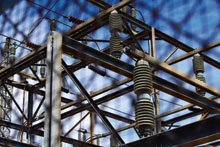University of Minnesota receives $2.5 million to revitalize electrical power engineering education

The University of Minnesota has been awarded $2.5 million in Recovery Act funding from the U.S. Department of Energy to lead a nationwide consortium of universities to revitalize electrical power engineering education. The funding is part of nationwide $100 million effort for 54 smart grid workforce training programs that will help prepare the next generation of workers in the utility and manufacturing industries.
The consortium led by University of Minnesota electrical engineering faculty will facilitate the implementation of labs at the university level to create a new educational framework in power engineering that will transform undergraduate and graduate education and research in the areas of renewable energy (such as wind and solar, storage, and energy conservation) and meet the challenges of making the electrical grid cleaner, smarter and more reliable.
This new funding complements other federal grants at the University of Minnesota, including those from the National Science Foundation, NASA, and Office of Naval Research. The award also builds on a recent $8 million U.S. Department of Energy grant to the University of Minnesota and regional partners for advanced wind energy research and strengthens efforts to create a center of excellence for smart grid research at the university.
This project includes a community of more than 80 collaborating universities that will further disseminate the laboratory curriculum to other universities and technical and community colleges in their region.
"Building and operating smart grid infrastructure will put tens of thousands of Americans to work," said U.S. Secretary of Energy Steven Chu. "Today's investment will help ensure that we have the workforce in place to meet this need. This is a great opportunity for workers to upgrade their skills and earn more, or for laid off workers from other industries to start fresh in a new and growing field."
Matching funds from various sources make up the remaining 40 percent of the total cost of the University of Minnesota-led project. These include: U of M Institute of Technology (soon to be called the College of Science and Engineering), Electrical Power Research Institute (EPRI), U of M Department of Electrical and Computer Engineering, U of M Initiative for Renewable Energy and the Environment (IREE), U of M Center for Electric Energy, and 65 universities across the country.
To view the full list of projects selected by the U.S. Department of Energy to receive funding visit, http://www.energy.gov/public-services/funding-financing.
